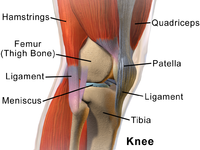
Photo from wikipedia
Abstract Objective To assess the impact of the Swedish health authority recommendation against the use of knee arthroscopy in patients aged ≥40 years with knee osteoarthritis (OA). Design Interrupted time… Click to show full abstract
Abstract Objective To assess the impact of the Swedish health authority recommendation against the use of knee arthroscopy in patients aged ≥40 years with knee osteoarthritis (OA). Design Interrupted time series analysis. Setting Public health care in Skåne region. Participants Patients aged ≥40 years who underwent knee arthroscopy from January 2010 to December 2015. Intervention(s) National guideline’s recommendation against the use of knee arthroscopy in patients with knee OA. Main Outcome Measure(s) 1) proportion of patients aged ≥40 years with a main diagnosis of Knee OA and/or degenerative meniscal lesions (DML) who underwent knee arthroscopy, and 2) overall knee arthroscopy rate per 100,000 Skåne population aged ≥40 years. Results A total of 6,155 knee arthroscopy were performed among people aged ≥40 years during study period. Of 42,044 patients with Knee OA/DML, 3,728 had knee arthroscopy. The recommendation was associated with reductions in the use of knee arthroscopy and two years after the recommendation, there was a reduction of 28.6% (95% CI: 9.3, 47.8) and 34.7% (23.9, 45.4) in proportion of Knee OA/DML patients with knee arthroscopy and the overall knee arthroscopy rate, respectively, relative to that expected if pre-recommendation trend continued. Our sensitivity analysis showed that the use of total knee replacement was stable over the study period. Conclusion The national recommendation was associated with reduction in use of knee arthroscopy in public health care in southern Sweden. However, still 4.5% of these patients underwent knee arthroscopy in 2015 implying that more efforts are required to achieve the recommended target.
Journal Title: International Journal for Quality in Health Care
Year Published: 2019
Link to full text (if available)
Share on Social Media: Sign Up to like & get
recommendations!